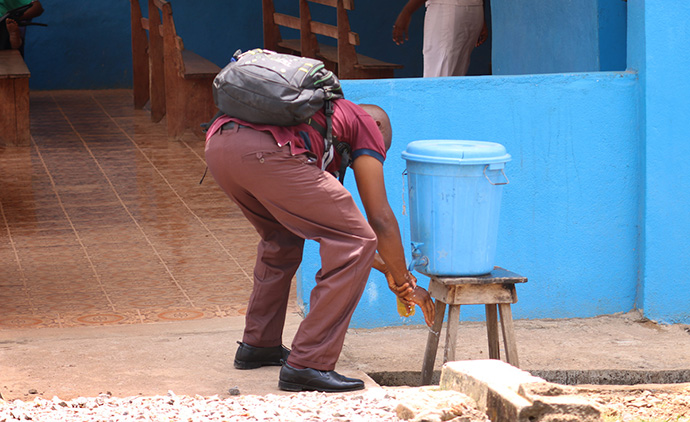
While Sierra Leone does not have any confirmed coronavirus cases yet, the government and United Methodist leaders and hospitals are taking precautionary measures in the wake of the country’s years-long battle with Ebola.
The West African country was hard hit by the world’s largest Ebola outbreak in 2014-16, which killed more than 11,000 people in Sierra Leone, Liberia and Guinea.
With cases of the coronavirus now confirmed in those neighboring countries, the Sierra Leone government has imposed travel restrictions advising citizens not to travel to countries with confirmed cases of COVID-19.
The restrictions, which went into effect March 16, have put on hold all United Methodist volunteer and partner visits to Sierra Leone, the majority of which come from the United States.
In the U.S., there have been more than 5,800 confirmed coronavirus cases and more than 100 deaths. Globally, more than 200,000 people have been infected and more than 8,000 have died.
Smart Senesie, Sierra Leone Conference missions and development director, said partners from Camp Hill United Methodist Church in Pennsylvania’s Susquehanna Conference and Solar Oven Partners, a United Methodist ministry from South Dakota, were due to arrive in the country in April. They have been advised by Sierra Leone Bishop John K. Yambasu to put their visits on hold.
More visits are likely to be canceled if the pandemic is not contained, he said.
Yambasu was scheduled to travel to the U.S. last weekend but called off his trip due to the global pandemic.
“I have canceled all my travels from today,” he said, noting that church meetings already have been called off.
On March 18, church leaders postponed the 2020 General Conference, which was scheduled for May 5-15 in Minneapolis.
In Sierra Leone, President Julius Maada Bio has been visiting the country’s borders and infectious disease control centers to check and reinforce preparedness to combat a likely coronavirus outbreak.
Alpha Wurie, minister of health and sanitation, said that the health ministry has activated the Emergency Operations Center — previously used to combat Ebola — to level two to coordinate the emergency preparedness and response activities. Four hospitals have been designated as sites for treating COVID-19, according to Dr. Brima Kargbo, Sierra Leone’s chief medical officer.
On Monday, Bio engaged former workers of the National Ebola Response Center to tap into their experience battling Ebola. He told the team he wanted to use that experience to mobilize Sierra Leoneans to fight against the coronavirus.
“We have quite a lot to gain from your experience and we want you to be part of this effort to prevent this (new) virus,” the president said, according to a press release.
United Methodist Mercy Hospital in Bo suffered its fair share of infections, lockdowns and death from Ebola. Hawa Augusta Kpanabom, a head nurse at the hospital, said March 16 that hospital staff learned a lot from that epidemic and it enhanced their experience in dealing with future outbreaks.
“This time, until they test negative, we are viewing every patient as infectious. We will use appropriate PPEs (personal protective equipment) in addition to other IPC (infection, prevention and control) precautions,” she said.
Staff are advised to assess the risk and prepare adequately before any contact with patients is made, she said, recalling a case from Ebola where a staff contracted the virus by removing an IV drip from a patient without gloves. The patient’s Ebola test was being processed while in admission.
To fight the coronavirus, Kpanabom explained that nurses will check the vital signs of incoming patients, and those who present with symptoms will be isolated in a room at triage. The laboratory has two other rooms reserved for those who test positive. She said all units of the hospital have been supplied personal protective gear.
Mercy Hospital already has several handwashing stations in addition to vital-signs checks at the triage before a patient is allowed into the hospital.
Jinnah Lahai, the hospital’s administrator, said handwashing is simple and less costly but also effective in preventing viral infections.
“No matter where you are coming from and who you are, you are encouraged to wash your hands before you are allowed within this facility,” he said.
“The Bo District health emergency team has been reactivated and includes all district stakeholders in health. A WhatsApp (messaging) group … has been set up and we are all aware of the pace of escalation of the pandemic and what steps government is taking,” Lahai said.
On March 16, the office of the president released a press statement banning overseas travel for all government officials and noting that public gatherings should not be attended by more than 100 people.
“Containing the spread of the coronavirus disease is the responsibility of every citizen. Therefore, the general public is advised to limit social contacts to the barest minimum and to alert healthcare service providers of any emergencies,” the release said.
The Liberian government and United Methodist leaders are taking similar precautions after the first COVID-19 case was recorded in the country March 16.
Liberian President George Manneh Weah has banned public gatherings in large numbers and United Methodist University of Liberia has suspended classes and all campus-based activities for two weeks
“We are under obligation to protect the students, faculty and administrative staff of the university,” said Albert Coleman, president of the university.
Jusu is director of communications for The United Methodist Church in Sierra Leone. E Julu Swen, a communicator in Liberia, contributed to this report.
News media contact: Vicki Brown at (615) 742-5470 or newsdesk@umcom.org. To read more United Methodist news, subscribe to the free Daily or Weekly Digests.
Like what you're reading? Support the ministry of UM News! Your support ensures the latest denominational news, dynamic stories and informative articles will continue to connect our global community. Make a tax-deductible donation at ResourceUMC.org/GiveUMCom.



